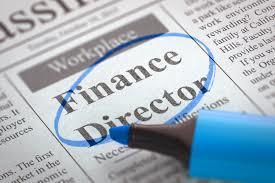Introduction of Finance directors
In the intricate shade of business operations, the part of finance directors emerges as a linchpin, driving fiscal success and sustainability. Finance director, frequently appertained to as fiscal directors or regulators, play a vital part in steering associations through the complications of fiscal geographies. This composition unravels the multifaceted liabilities and significance of the part of finance directors, probing into their core functions, essential chops, and the evolving dynamics of their profession.

Defining the part of Finance directors
The part of finance directors is multifaceted, encompassing a different range of liabilities that are integral to the fiscal health of an association. These professionals serve as custodians of fiscal coffers, decision- makers, and strategic counsels, contributing significantly to the overall success of the business.
A. The Abecedarian description
part of Finance directors Defined
The part of finance directors is defined by their responsibility for overseeing the fiscal conditioning of an association. This includes fiscal planning, budgeting, threat operation, and strategic decision- timber. Finance director play a critical part in icing the effective application of fiscal coffers and aligning fiscal strategies with organizational objects.
Strategic Decision- Making
One of the primary angles of the part of finance directors is their active involvement in strategic decision- making processes. By using fiscal perceptivity and analyses, finance director contribute to opinions on investments, cost operation, and resource allocation, aligning fiscal strategies with the broader pretensions of the association.
II. Core Functions of the part of Finance directors
The core functions of finance directors are necessary in shaping the fiscal geography of an association. From budgeting and fiscal analysis to threat operation and investment opinions, these functions define the day- to- day conditioning that contribute to the fiscal success of a business.
Budgeting and Financial Planning
Strategic Budgeting
A abecedarian function within the part of finance directors is strategic budgeting. These professionals unite with colorful departments to develop comprehensive and strategic budgets. By assaying once fiscal performance and soothsaying future trends, finance directors insure that budgets align with the association’s pretensions, easing optimal resource allocation.
soothsaying
Finance directors engage in fiscal soothsaying to anticipate unborn fiscal requirements and challenges. Through the analysis of request conditions, assiduity trends, and internal factors, they give precious perceptivity that support visionary decision- timber. Accurate soothsaying is consummate for maintaining fiscal stability and conforming to changing profitable geographies.
Financial Analysis and Reporting
Performance Analysis
A critical aspect of the part of finance directors is conducting thorough fiscal analyses to estimate the performance of different business units or systems. Metrics similar as profitability rates, return on investment( ROI), and cost- effectiveness measures are employed to assess the effectiveness of operations and identify areas for enhancement.
fiscal Reporting
Timely and accurate fiscal reporting is a foundation function within the part of finance directors. They prepare fiscal statements, including income statements, balance wastes, and cash inflow statements, to offer a comprehensive overview of the association’s fiscal health. Transparent reporting supports effective communication with stakeholders, similar as investors, controllers, and internal decision- makers.
Risk Management
relating and Assessing pitfalls
Within the part of finance directors, relating and assessing fiscal pitfalls is a pivotal responsibility. This includes assessing request pitfalls, credit pitfalls, and functional pitfalls. Through rigorous threat assessments, finance director develop strategies to alleviate implicit pitfalls and guard the association’s fiscal stability.
Compliance Management
icing compliance with fiscal regulations and account norms is an essential function of finance directors. They stay abreast of evolving nonsupervisory conditions, apply internal controls, and oversee inspection processes to guarantee adherence to legal and fiscal norms.
Capital Budgeting and Investment opinions
Capital Allocation
Finance directors are laboriously involved in capital budgeting, where they estimate investment openings and allocate fiscal coffers to systems aligned with the association’s strategic objects. They assess implicit returns, pitfalls, and the long- term impact of investments to make informed opinions on capital allocation.
Cost operation
Effective cost operation is a central function within the part of finance directors. They dissect cost structures, identify areas of inefficiency, and apply cost- saving measures without compromising the quality of products or services. Cost operation is pivotal for maintaining fiscal effectiveness and competitiveness.
III. Chops and rates of Successful Finance directors
To exceed in the multifaceted part of finance directors, individualities must retain a different set of chops and rates. Beyond specialized moxie, effective communication, leadership, and rigidity are essential attributes for success in the dynamic field of fiscal operation.
Technical Proficiency
Financial Acumen
Successful finance directors must demonstrate a deep understanding of fiscal principles, counting norms, and profitable trends. This includes proficiency in fiscal modeling, analysis, and the capability to interpret complex fiscal data.
Data Analysis
The capability to work data analysis tools and interpret fiscal data is pivotal for finance directors. Proficiency in spreadsheet software, fiscal modeling software, and data visualization tools enhances their capacity to prize meaningful perceptivity from large datasets.
Strategic Allowing
Decision- Making
Strategic decision- timber is a critical skill for finance directors. They must be suitable to weigh pitfalls, consider long- term consequences, and align fiscal strategies with organizational pretensions to contribute effectively to decision- making processes.
Strategic Planning
Finance director engage in strategic planning to align fiscal objects with the broader organizational strategy. They contribute to the expression of business plans, icing that fiscal pretensions support the company’s charge and vision.
Communication Chops
Effective Communication
Finance directors must communicate complex fiscal information in a clear and terse manner. Whether presenting fiscal reports to directors, uniting with department heads, or liaising with external stakeholders, effective communication is essential for conveying fiscal perceptivity and recommendations.
Interdepartmental Collaboration
Collaboration across departments is integral to the success of finance directors. They work nearly with marketing, operations, and mortal coffers brigades to align fiscal strategies with the overall pretensions of the association.
Leadership and Adaptability
Leadership
Finance directors frequently lead finance brigades, taking strong leadership chops. They must motivate and guide their brigades, fostering a cooperative and results- acquainted work terrain. Leadership is essential for driving fiscal enterprise and icing the platoon’s alignment with organizational objects.

Rigidity
The fiscal geography is dynamic, subject to constant changes in regulations, request conditions, and technological advancements. Finance directors must be adaptable, embracing change and proactively conforming fiscal strategies to navigate evolving challenges.
IV. The Evolving part of Finance director
As the business geography continues to evolve, the part of finance directors is also witnessing metamorphosis. Several factors contribute to the evolving nature of their liabilities.
Technology Integration
The integration of technology, particularly artificial intelligence and robotization, is reshaping the part of finance directors. robotization of routine tasks, data analysis through AI, and the use of advanced fiscal software allow finance director to concentrate on advanced- value strategic conditioning.
Strategic Business Partner
Finance director are decreasingly seen as strategic business mates rather than bare number crunchers. Their involvement in decision- making processes, strategic planning, andcross-functional collaboration positions them as integral contributors to the overall success of the association.
V. The Future of Finance directors
Looking ahead, the future of finance director holds instigative possibilities and challenges. Arising trends and advancements in technology are anticipated to shape the line of fiscal operation.
Technological Advancements
The uninterrupted integration of technology, including AI, machine literacy, and blockchain, will further streamline fiscal processes. Finance directors will work these tools to enhance delicacy, effectiveness, and decision- making capabilities.
Focus on Sustainability
The growing emphasis on sustainability is likely to impact the part of finance director. As associations prioritize environmental, social, and governance( ESG) considerations, finance directors will play a pivotal part in integrating sustainability into fiscal strategies and reporting.
Strategic Risk Management
In an period of adding misgivings, finance director will concentrate on strategic threat operation. This involves not only relating and mollifying pitfalls but also proactively using threat- taking openings to drive invention and growth.
VI. Conclusion
In conclusion, the part of finance directors is dynamic and multifaceted, encompassing liabilities that are integral to the fiscal success and sustainability of associations. As custodians of fiscal coffers, decision- makers, and strategic counsels, finance director navigate the complications of fiscal geographies, contributing significantly to the overall success of businesses.
To exceed in this vital part, finance director must continuously hone their specialized chops, grasp strategic thinking, and cultivate effective communication and leadership rates. As the business terrain continues to evolve, finance director who are adaptable, forward- allowing, and technology- expertise will be well- deposited to drive fiscal success and navigate the challenges of an ever- changing fiscal geography.
